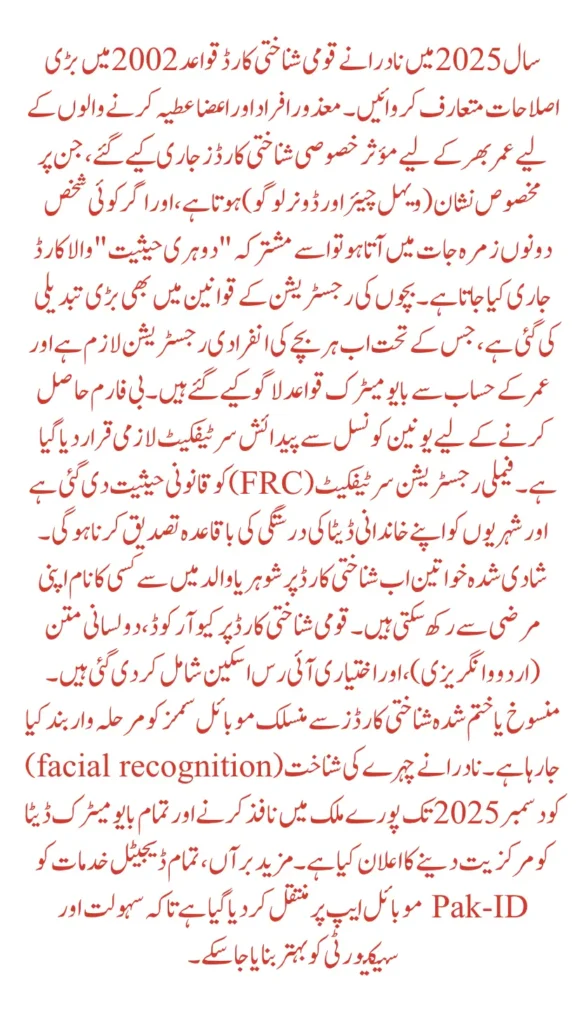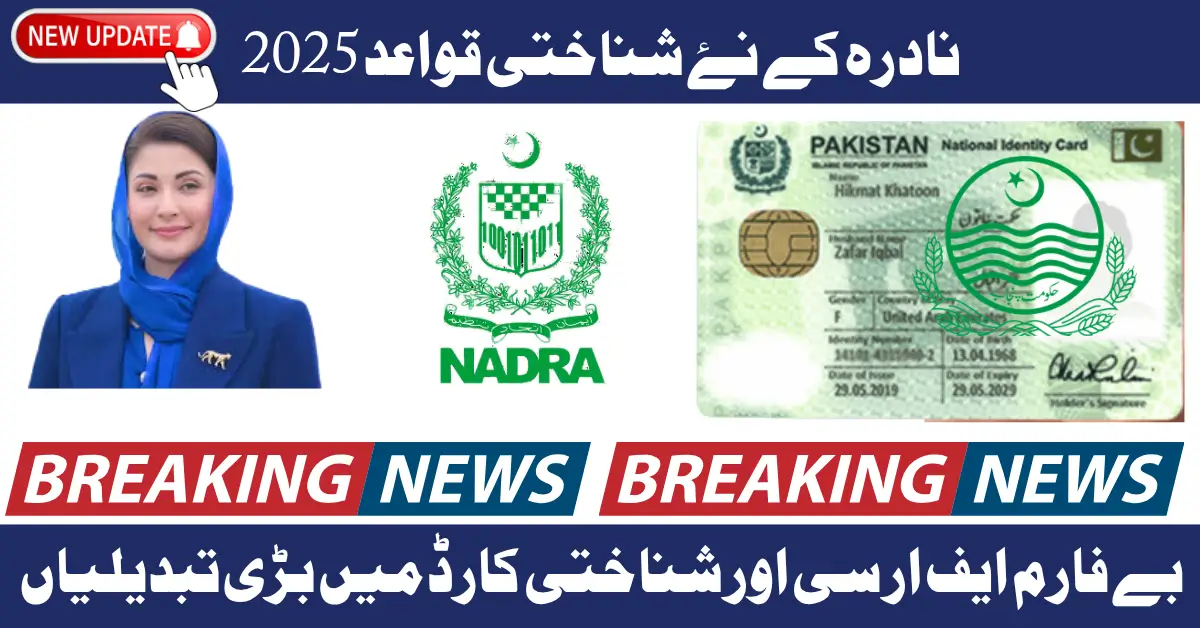Upgraded NADRA Non-Chip
Acting on the instructions of Federal Minister for Home Affairs Mr. Mohsin Naqvi, the National Database and Registration Authority has carried out significant revisions to the National Identity Card Rules of 2002. These changes aim to modernize the identity system and strengthen its security framework. NADRA first introduced the identity rules in 2002 after its formation and has now overhauled them to address present-day challenges and technological advancements. Upgraded NADRA Non-Chip. The Minister guided the development of the reform draft, and the federal cabinet formally approved it. NADRA has begun enforcing the updated rules to improve the system’s robustness, efficiency, transparency, and alignment with international standards. Upgraded NADRA Non-Chip ID Card 2025.
Age-Based Biometric Rules Announced for B-Form Registration, NADRA Non-Chip ID Card 2025.
Under the revised rules, NADRA now requires birth registration with the Union Council before issuing a B-Form. Children under the age of three do not need to provide biometrics or photographs. For those aged between three and ten, parents must explain, and officials will conduct an iris scan if available. Children between the ages of ten and eighteen must provide a photograph and thumb impression, along with an iris scan where available.NADRA will now issue each child an individual B-Form that includes an expiry date. Existing B-Forms remain valid, but parents must obtain a new B-Form to apply for a passport. Upgraded NADRA Non-Chip.

These reforms aim to curb fraudulent registrations and play a vital role in combating serious crimes such as child trafficking and identity misuse.
The amended rules have granted legal status to the Family Registration Certificate through the issuance of original documents. Going forward, citizens will only be able to acquire an FRC based on verified NADRA records.
Major Reforms in NADRA Family Registration and ID Verification System, NADRA Non-Chip ID Card 2025.
The updated rules define three distinct types of family structures: one comprising parents and siblings, another consisting of a spouse and children, and a third that includes stepfamilies, adopted children, and search-based family connections. The new system allows individuals to update or correct family information through the NADRA mobile app or by visiting a NADRA office. If NADRA finds someone mistakenly included in a family record, it can remove their details.
Previously, authorities did not grant the FRC legal standing, which allowed people to misuse it in sensitive matters such as inheritance claims and second marriages.
Under the revised rules, the FRC will now include complete and separate family details for men with more than one marriage, ensuring greater transparency and accountability.
Chief Minister IT Training & Digital Skills Program for Rural Women
Verification Boards Given 30-Day Limit
These reforms aim to eliminate doubts surrounding this sensitive social issue and prevent the misuse of the Family Registration Certificate (FRC) for false or misleading information. After thoroughly assessing the challenges citizens faced in ID card cancellation or confiscation cases, the authorities introduced significant improvements.
Under the updated rules, verification boards at the district, regional, and central levels must investigate fake identities and issue a final decision within 30 days. Authorities can now cancel or seize national identity cards, B-Forms, and FRCs if they detect fraud.
In addition to the smart card, NADRA also issues a non-chip ID card. As part of the recent reforms, NADRA has incorporated enhanced smart card features into the non-chip version. Despite these upgrades, the non-chip card remains significantly more affordable. It will now include both Urdu and English text, as well as a QR, all without any additional charges.
The NIC Rules 2002 (National Identity Card Rules), established under the NADRA Ordinance 2000, govern the issuance, renewal, and regulation of CNICs (Computerized National Identity Cards) in Pakistan. Over the years, several major reforms have been introduced to modernize and streamline the system.
Major Reforms in the NIC Rules 2002
1. Introduction of Smart NIC
- Year: 2012
- NADRA introduced Smart NIC with a chip-based card offering biometric security and multi-purpose usage.
- Replaced the older CNICs with improved data protection and encryption.
2. Biometric Verification System
Introduced for SIM registration, banking, and welfare programs
Ensures only genuine citizens can access services and prevents identity theft.
3. Online CNIC Services
- Citizens can now apply, renew, and modify CNICs online through NADRA’s portal.
- Mobile apps and online tracking have been added for ease of access.
4. Minor CNIC
Introduced for children under 18 years, enabling them to be digitally included in national records.
- A requirement for family registration certificates and passport applications.
5. Revamp of Verification & Re-verification Campaign
- NADRA conducted nationwide re-verification of CNICs (2016–2018) to remove fake or unverified identities.
- Involved SMS-based family tree confirmation by citizens.
6. Integration with Government Programs
- CNICs linked to:
- BISP / Ehsaas Program
- Taxation and property records
- E-voting pilot projects
- BISP / Ehsaas Program
- Ensured transparency and traceability in welfare disbursements.
7. Gender & Marital Status Inclusion
- Reforms allowed transgender persons to be registered with their accurate gender identity.
- Marital status updates allowed women to retain maiden names if desired.
8. Updated Fee Structure & Service Categories
- NADRA revised its fee structure to include normal, urgent, and executive categories.
- Also introduced home delivery and mobile van services.
9. Foreign Nationals & Overseas Pakistanis
- NICOP and POC (for foreigners of Pakistani origin) policies were streamlined.
- Fee reductions and simplified online application processes added.
10. Security Enhancements
- Machine-readable CNICs with MRZ were introduced.
- Improved anti-counterfeiting measures to prevent duplication and forgery.
8171 Check Online By CNIC – Get BISP 13,500 Payment Eligibility Details Now!
Major Reforms in NIC Rules 2025
1. Lifetime Special Cards for Disabled Persons & Organ Donors
- NADRA introduced lifetime-valid CNICs for:
- Persons with disabilities, marked with a wheelchair symbol.
- Organ donors, with a distinct donor icon.
- Persons with disabilities, marked with a wheelchair symbol.
- Individuals qualifying under both categories can obtain a dual-status card combining both features.
2. Overhauled Child Registration
Individual registration is now mandatory for every child; group entries are discontinued.
- Age-based biometric/photo rules:
- Under 3 years: No photo or biometrics; form expires at age 3.
- Ages 3–10: Photo and iris scan (where available).
- Ages 10–18: Full biometrics including fingerprints, photo, and iris scan.
- Under 3 years: No photo or biometrics; form expires at age 3.
- A Union Council-issued birth certificate is now required before CRC issuance.
3. Revamp of Family Registration Certificate (FRC)
- FRCs are now legally binding documents.
- Citizens must submit a formal declaration affirming data accuracy.
- Family structures are categorized into:
- Alpha (by birth)
- Beta (by marriage)
- Gamma (by adoption)
- Alpha (by birth)
- Details of all spouses and children are now compulsory, particularly important for multiple marriages.
- Married women can now opt to retain either their father’s or husband’s name on their CNIC.
4. CNIC Modernization & Digital Features
- Non-chip CNICs upgraded with:
- QR codes for authentication.
- Bilingual text (English and Urdu).
- An optional iris scan for identity confirmation.
- QR codes for authentication.
- All requests for CNIC cancellation or restoration must be processed within 30 days.
5. SIM Blocking Linked to CNIC Expiry
- SIM cards associated with expired or canceled CNICs (since 2017) are being systematically blocked to combat identity fraud.
6. Nationwide Facial Recognition & Centralized Biometrics
- NADRA will implement facial recognition technology nationwide by December 31, 2025.
- A complete ban on decentralized biometric databases—all agencies must integrate with NADRA’s centralized system.
7. Pak‑ID Mobile App Adoption
- All digital NADRA services transitioned to the Pak‑ID mobile app as of January 17, 2025.
- The app supports:
- Biometric login, especially for overseas Pakistanis.
- Online CNIC modifications and applications.
- Biometric login, especially for overseas Pakistanis.
8. National Registration & Biometric Policy (NR&BP)
- A comprehensive framework to:
- Link NADRA with the Union Council birth/marriage registries.
- Standardize biometric protocols across all institutions.
- Link NADRA with the Union Council birth/marriage registries.
- Aligned with UN Sustainable Development Goal 16.9: providing legal identity for all by 2030.
